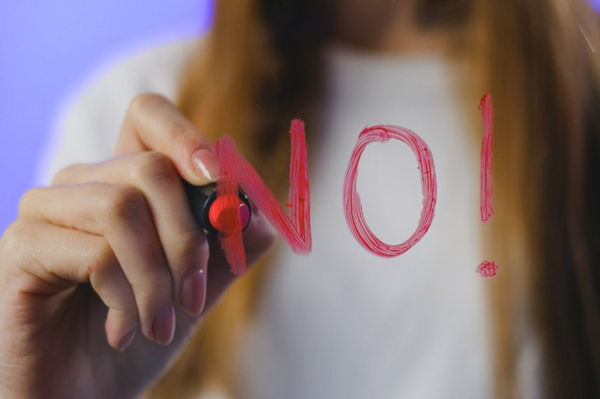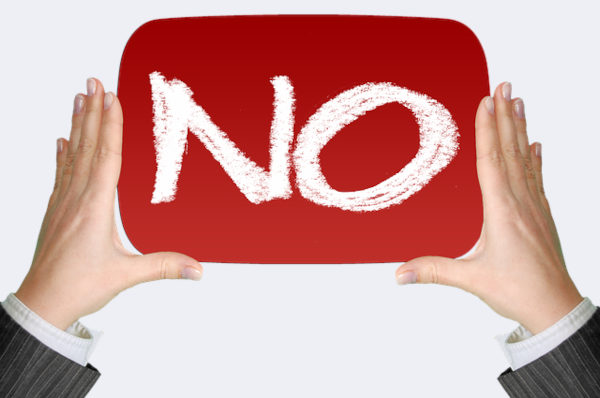Taking care of our mental and emotional health is a vital aspect of living well, which a significant segment of the population often overlooks. Taking care of ourselves may take many forms, and one of the most important ways is to set boundaries for ourselves regarding how we relate to others.
Healthy boundaries can be set and maintained by learning how to say ‘no’ to requests, opportunities, and suggestions that you may not be comfortable with for whatever reason. Most people try to be as agreeable as they can to those around them, mistakenly thinking that the way to achieve this is by saying ‘yes to everything. Instead, this is what leads to frustration, stress, and being overwhelmed.
Let’s take a look at the power of the word ‘no’ and how you can make use of it to create healthy boundaries for yourself, some of the various ways it benefits us, and how to train ourselves to make use of it more often.
What is the Power of No?
The Power of No can be described as a shield against exploitation that can save you plenty of time, money, and emotional distress. It can be utilized by anyone seeking to build healthy boundaries as they try to live harmoniously with those around them. These are the sort of boundaries that ensure everyone lives in an environment of mutual respect and consideration.
Saying no to those around us can be a daunting prospect, especially since it goes against our natural inclination to be reassuring and polite to our neighbors. Still, it can be a vital tool in your mental health toolbox, as harboring an inability or unwillingness to say no if and when necessary can lead to burnout, resentment, and overall stress.
Is Saying No a Bad Thing?
Part of being a functional adult is taking responsibility for your health and wellbeing. A key aspect of this is to determine what is good for you and what is not, and this will include what you’re willing to do and what you are not willing to; including this reason, saying no is not a bad thing, as long as it’s the right decision for you.
Whenever a loved one, friend, or colleague comes up to you with a request, it will be upon you to decide whether to say yes or no. While your instinct might be to say yes every time, you need to keep in mind that you will lose time, energy, and potential opportunities when you commit to fulfilling the request facing you. As a responsible, mature human being, you need to cultivate an attitude of careful reflection whenever you are presented with requests or questions that will take up your resources.

What Are the Benefits of Saying No?
When we set up healthy boundaries concerning our time, efforts, and personal space using the power of the word ‘no,’ we not only eliminate the source of many interpersonal conflicts and relationship challenges but enrich our lives in various other ways. These include:
Establishing Healthy Relationships
Collaboration is at the heart of all societal relationships, whether professional or personal. We often get caught up trying to make those around us as comfortable and reassured as possible, which often leads us to say yes in situations where we would rather not. This might seem like a good idea at first, but it can very quickly lead to resentment and ill-feeling on your part since you might find yourself feeling misused or unappreciated after the fact. To keep the chances of this eventuality minimal, the ability to say no or yes where appropriate will come in handy.
Leaving Room for Other Options
It is critical to realize that each time we say yes to something, we are essentially saying no to everything else. In other words, saying yes means we are committed to a certain specific action at some future block of time, and we cannot allocate that time to anything else in the world. This makes the act of saying yes similar to taking on debt – you’ll have to pay it back whether you like it or not, so make sure it is spent on things you consider worthwhile.
Fewer Chances of Regret
One great way of making sure you do not say yes to requests or questions you would rather avoid is to take some time before making your response. While it is true that we often have to do things we do not like as responsible human beings, you might need to take a closer look at your decisions if you find yourself saying yes to everything.
Being the type of person to say yes to everything is a sure recipe for building up resentment against the people around you, which is detrimental to your relationship with them.
Establishing the Value of Your Time
To let everyone, yourself included, that your time is valuable, you need to practice saying no to things you do not want to do. The act of turning down undesirable offers or situations is effective in creating distance between yourself and negative characters or situations that you might encounter.
Related reading: Scientific Studies on Positive Thinking – Opens in new tab.

How to Say No Without Being Rude
There are plenty of reasons why people find it easier to say yes rather than no, even when they prefer the latter. Whether at home, at work, in school, around strangers, or among loved ones, the inclination for most ordinary people, when faced with a request, is to say yes so that we do not seem rude, unhelpful, or arrogant.
It is important to cooperate and collaborate with those around you to live well in today’s society, which means saying yes to some requests. However, in our efforts to maintain healthy relations with those around us, we shouldn’t go overboard. Saying no will be a necessity, but there are ways you can do this so that no feelings are hurt and the relationship remains as strong as ever.
- First of all, you need to be direct when saying no. By all means, perform whatever favor you feel able to do, but don’t hesitate or fumble your words whenever you’re delivering negative answers. The idea is to make sure that the answer is delivered clearly and unambiguously in such a way that the requester knows not to press the matter, hoping to change your mind. Be firm without being brash.
- Second, take your time. When you take a couple of seconds to consider your answer before delivering it, the requester will be more likely to believe that you gave their request a good amount of thought and that your decision is a well-considered, firm answer. A quick, off-hand answer may be construed as a very rude gesture, even if you have every right to decide how you spend your own time.
- Third, be sympathetic to the requester’s plight. They might be in a tight bind, and you might want to show that while you sympathize with their situation, you simply can’t help them out. A good way of showing that you are willing to help where possible is to tell them what you CAN do even as you decline their initial request. This will show a willingness to help according to your availability and capabilities.
How Do You Get Better at Saying No?
A popular concept in productivity enhancement and high performance speaks of ‘Upgrading your No.’ This strategy seeks to make people more mindful of the value of their time as they grow more successful and their time becomes more valuable.
Say you own your own business. In the early days when you’re just starting, you might be able to spare a couple of hours helping a friend with their project with no fuss. Ten years later, when you are the CEO of a thriving company, you will need to consider the decision to take time off work to help a friend much more intensively. This is because the value of your time will have gone up considerably.
You will need to grow or upgrade your no to keep up with your life progress in such circumstances. Aside from simply saying no to distractions, you will also need to figure out the seemingly positive opportunities and things that offer marginal value to your life.
People at all levels of life make one common mistake: worrying about their productivity when the problem lies with their choice of activity. They seek to optimize their performance rather than eliminate those activities that are pointlessly filling up the hours of their day. As they say, there’s no point in doing the wrong thing well.
Final Thoughts
Saying no does not come easily to most people, so do not worry if you find yourself still saying yes to all the requests that come your way. It takes time to build up the resistance required to say no when needed, so don’t be afraid to give yourself time to practice it. Eventually, you will find it easier to put yourself and your needs first and begin to enjoy the Power of No.
Related Reading: How Do My Thoughts, Beliefs, and Actions Affect My Outcomes? – Opens in new tab.
♦ If this article resonates with you, please join our newsletter by using the forms on this website so we can stay in touch.
Stay in Touch
 Join our newsletter by using the forms on this website or click here!
Join our newsletter by using the forms on this website or click here! Follow us on Google News
Follow us on Google News Follow us on Facebook
Follow us on Facebook
Featured Image by Ulrike Leone from Pixabay








